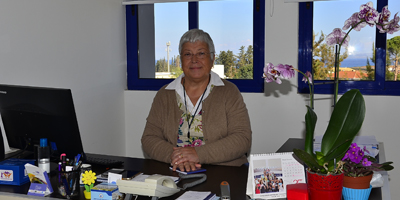EUL Academician Ataman discussed the issue of “Friendship with Special Needs Children”

Teachers have a facilitating role in developing relationships
European University of Lefke (EUL) Special Education Teaching Department Head Prof. Dr. Ayşegül Ataman gave information on “Friendship with Children with Special Needs”.
Pointing out that two environments are very important in the life of the child, Ataman stated that the first of these is the family environment and the second is the school environment and that the most basic needs of the child in Maslow’s hierarchy of basic needs must be met in the family environment. Ataman these requirements; He stated that these needs of the child as nutrition, care, protection, belonging, love, trust and attachment must be provided by the family in the first three years of life.
“In family relationships, there is blood bond and kinship. It is unrequited love and trust that are fundamental to relationships with parents and siblings, grandparents. The child learns the basic skills of human relations in the family environment, problem solving, negotiation, interaction and communication skills. Moral rules, ethics, social rules, respect, etc. He earns his examples by living in the family, ”said Ataman, adding that, in addition to basic skills, these skills enable him to develop adaptive behaviors when he meets other people in the future.
“The school environment is quite different from the family environment. The child has to share the same environment with his peers, each of whom comes from a different family, culture and social environment, to wait in line, to obey the rules, to develop the skills of working in cooperation and to learn new information, to get along with his friends, to have activities, to make friends, ”said Ataman. He stated that the effect of the two environments on the individual is the same regardless of the characteristics of the child, and that he has to acquire these skills, whether he is a child who is developing normally or a child with special needs, and these skills play key roles in the child’s self-realization.
Stating that when children with special needs receive education in separate educational institutions, they have to establish friendships with their peers from their own disability groups, Ataman said, “The fact that children with special needs receive education in schools established according to their disability is a situation that prevents integration and inclusive approach. As stated, friendship with their peers may cause them to marry a similar person in their future life, and if there is a hereditary inadequacy, it increases the possibility of being followed in the children to be born ”.
- Ataman said, “Many factors affect the acquisition of friends of children with special needs who are studying in inclusive and integrative inclusion environments” and listed these factors as follows;
- The reaction of families of children with normal development
- How the teacher informs the whole class about the child with special needs,
- Whether the teacher knows the strategies of how to differentiate the program for children with special needs,
- The attitude of the socio-economic social structure of the school towards individuals with special needs.
- How is the classroom environment arranged
“If all these factors are created in a constructive way, children with special needs can easily develop friendship relations. Especially in early childhood and primary education, the main purpose of children in making friends is to be a person who can play games together. Other features of the friend; For example, there are no features such as gender, socio-economic level, disability or not. ”Ataman pointed out that teachers have a facilitator role in developing relationships and that the child with disabilities should emphasize the similarities, not the differences, but what they have achieved, rather than what they cannot do.
Stating that “Normally developing children may be hesitant in developing friendship relations with their classmates, who are affected by their inadequacy due to the fear that they may marginalize their friends due to lack of knowledge, experience and experience”, Ataman stated that it is necessary for the teacher to implement collaborative teaching strategies and to organize joint activities during breaks and lessons.
Ataman said, “From the point of view of disabilities, in developing friendship relations with a visually impaired child, we must first address him by name and present ourselves. We have to talk or say that we will leave when communication is over. While walking with him, we need to make him hold our arm by the elbow, tell him about the obstacles on the road (pit, stone, pavement, car, etc.). They can play football with the ball that makes a noise with him, play chase with the circle, go to the cafe together, watch movies and theater, ” she said.
